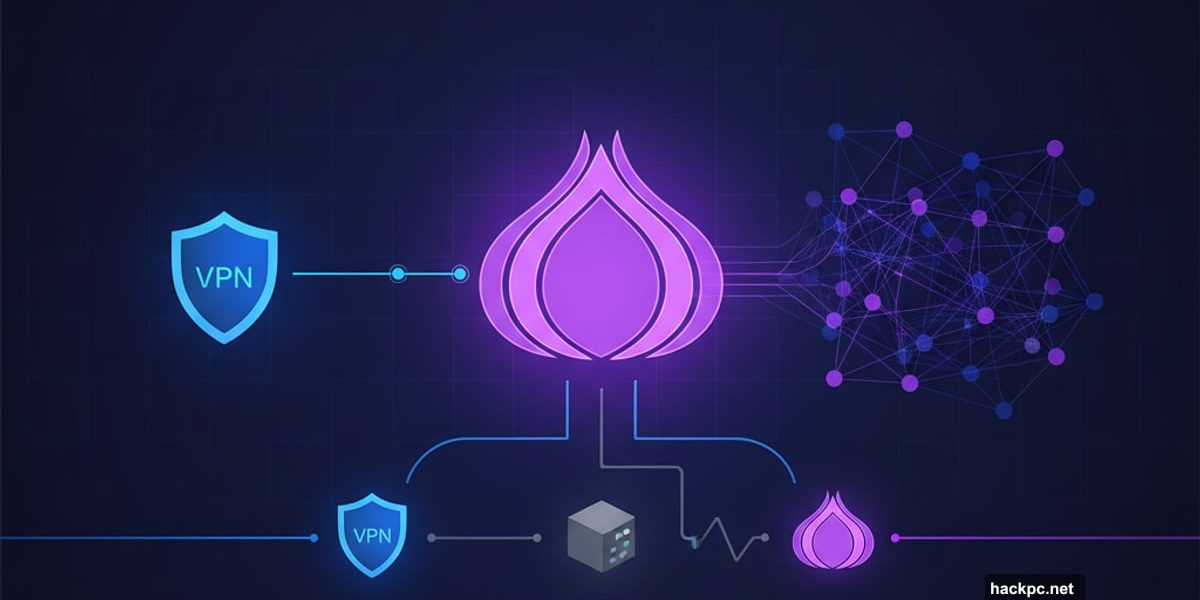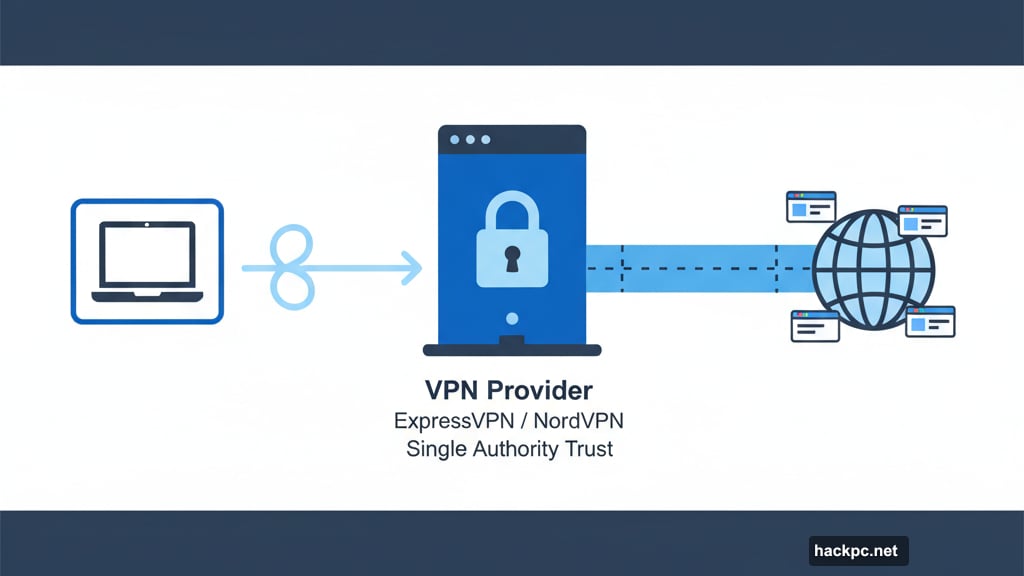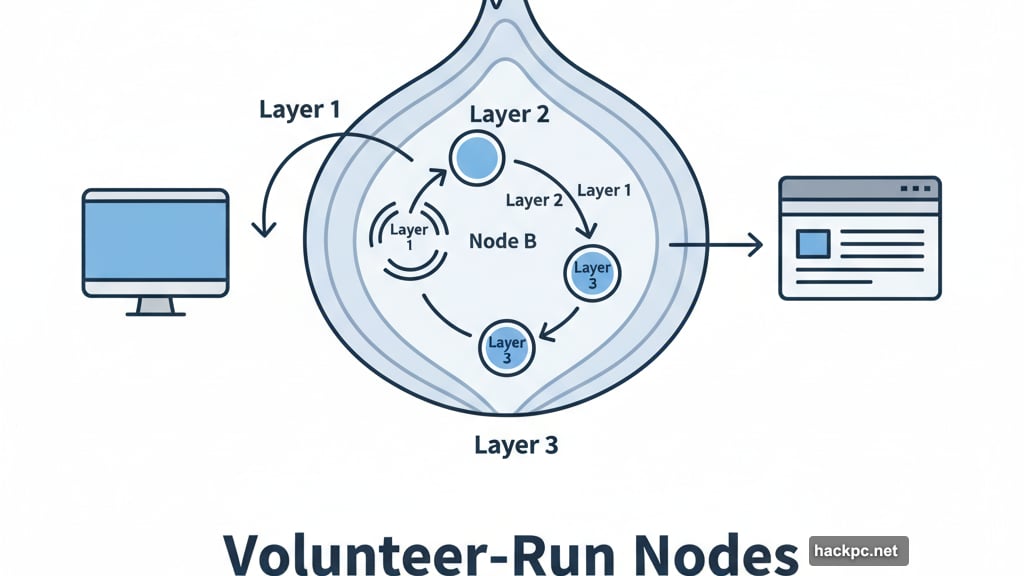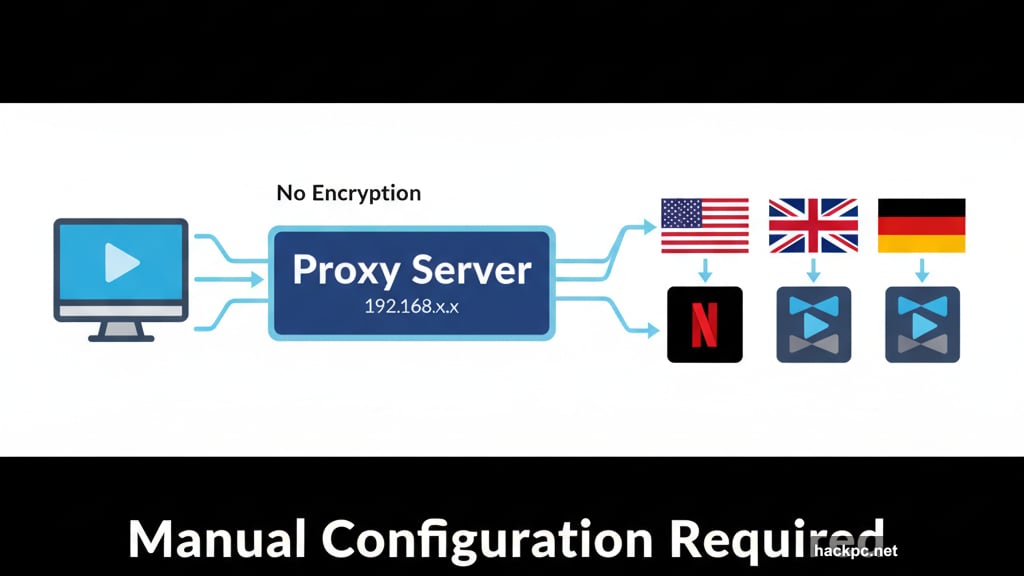
VPNs dominate privacy conversations. But they’re not always the right tool for the job.
Most people treat VPNs as a privacy silver bullet. Just flip the switch and you’re protected, right? Not quite. Sometimes you need a proxy server. Other times, you need the Tor network. Each tool hides your IP address differently, and choosing wrong leaves gaps in your privacy.
Let’s break down when to use each one and why it actually matters.
VPNs Encrypt Everything But Trust One Company
Virtual private networks route your traffic through encrypted tunnels to servers run by your VPN provider. Websites see the VPN server’s IP instead of yours. Plus, encryption keeps your ISP from monitoring what you’re doing online.
Sounds perfect. But there’s a catch.
You’re trusting one company with all your internet activity. Sure, top providers like ExpressVPN and NordVPN claim strict no-logs policies. Some even get third-party audits. However, you’re still putting faith in a single authority to handle your data responsibly.
For most people, that’s fine. Modern VPNs offer strong encryption and don’t noticeably slow your connection. In fact, the fastest VPNs keep speed loss under 25%. You get user-friendly apps for phones, computers, and streaming devices that make setup effortless.
But VPNs aren’t designed for maximum anonymity. That’s where Tor comes in.
Proxies Change Location Without Encryption
Proxy servers sit between your device and the internet, just like VPNs. Websites see your proxy’s IP instead of yours. But proxies skip encryption entirely.
That makes them faster on paper. However, free proxy servers usually crawl along slower than paid options or quality VPNs. Plus, you lose crucial privacy protections without encryption.
So when should you use a proxy? Specific situations where you need IP masking but don’t care about encryption overhead.
Say you run an e-commerce site and want to see how it renders in different countries. Load a proxy in your browser and instantly check various regions. Or maybe you want to unblock streaming content that’s typically not privacy-sensitive. Proxies work fine for that.

But setting them up requires manual configuration in your device or browser settings. You need to maintain lists of proxy IPs and swap them by hand. That’s nowhere near as convenient as clicking a VPN server from a dropdown menu.
For casual users, proxies just aren’t worth the hassle.
Tor Network Offers Pseudo-Anonymity Through Decentralization
The Onion Routing project takes a completely different approach. Instead of trusting one company’s servers, Tor encrypts your traffic in layers and routes it through thousands of volunteer-run nodes.
Here’s how onion routing works. Your data gets wrapped in multiple encryption layers like an onion. As packets travel from node to node, each one peels away a layer. By the time your traffic exits the network, the original encryption is removed and data reaches its destination.
No single node knows both where traffic came from and where it’s going. That makes surveillance through traffic analysis extremely difficult.
Journalists and activists rely on Tor for a reason. It’s built from the ground up for pseudo-anonymity. However, the decentralized design comes with trade-offs.
Speed takes a massive hit. Routing through multiple servers is hugely inefficient. Don’t expect to stream Netflix or download large files over Tor. Real-time traffic will lag unacceptably.
Moreover, exit nodes potentially see unencrypted traffic. If you’re not using additional encryption like HTTPS, the exit node could read your data. Fortunately, most modern websites use transport layer security. But that risk doesn’t exist with VPN providers.
Some VPNs like NordVPN and Proton VPN offer Onion over VPN servers. They handle Tor connections automatically without separate software. The Brave browser also makes connecting to Tor dead simple through private windows.
Speed Battle: Proxies Win in Theory, VPNs Win in Practice
Theoretically, proxies should be fastest. They don’t encrypt anything, so all bandwidth goes toward actual internet traffic. Both VPNs and Tor add encryption overhead that slows things down.
But theory doesn’t match reality.
Most free proxies are painfully slow. Meanwhile, premium VPN providers constantly upgrade infrastructure to deliver high-speed connections. ExpressVPN and NordVPN invested heavily in 10-gigabit servers and optimized protocols.

During testing, top VPNs kept speed loss at 25% or less. On fast connections like cable or fiber, you won’t notice the difference. So in practice, quality VPNs often outperform even paid proxies.
Tor comes in dead last. Multi-hop routing through volunteer servers means bandwidth plummets compared to direct connections. That’s the price of pseudo-anonymity.
Coverage Differences Matter for Your Whole Network
VPN apps typically encrypt all device traffic by default. Whether you’re browsing, streaming, or using apps, everything runs through the same encrypted tunnel. Some VPNs offer split tunneling if you want selective coverage.
But VPN browser extensions usually only protect browser traffic. ExpressVPN’s browser extension is an exception since it controls the desktop app remotely.
Proxies can be just as versatile with enough effort. However, achieving something like split tunneling requires manual configuration that VPNs handle in seconds. Proxies shine on older devices that don’t support VPN clients, like certain smart TVs or game consoles.
Tor coverage depends on your setup. The Tor Browser only encrypts browser traffic. But Onion over VPN servers from NordVPN or Proton VPN tunnel your entire device through Tor automatically.
There’s also Tails operating system. This portable privacy-first OS runs off a USB flash drive and routes all traffic exclusively through Tor, regardless of which app you’re using.
Streaming Works on VPNs and Proxies, Not Tor
Netflix, HBO Max, and Disney Plus work fine through VPNs or proxies as long as your IP isn’t blocked. However, streaming quality depends heavily on server infrastructure.
Cheap providers with congested networks will buffer constantly. Premium services maintain smooth playback even when connected to distant servers.
Tor is completely wrong for streaming. The network isn’t built for high-bandwidth applications. Expect constant buffering and degraded video quality. Real-time traffic simply doesn’t work over Tor’s multi-hop routing.
Tor Costs Nothing, But VPNs Deliver Better Value
Tor is free and open-source. You get pseudo-anonymity without spending a dollar. But volunteer networks mean slow speeds and limited bandwidth.
If you need strong privacy and can’t afford VPN subscriptions, Tor provides incredible value. Just don’t expect to stream video or download files quickly.

VPNs and proxies cost roughly the same, around $5 to $15 monthly. But VPNs deliver far more value. Top services offer hundreds of server locations, device support across platforms, and user-friendly apps. Plus you get encryption, ad-blocking, split tunneling, and encrypted DNS servers.
For most people, that extra functionality is absolutely worth the cost.
Combine Tools for Maximum Privacy
You don’t have to choose just one. Use them together for extra protection.
Connect to a VPN first, then launch Tor Browser. Your ISP sees VPN traffic but can’t tell you’re accessing Tor nodes. The VPN encrypts your connection to Tor, adding another privacy layer.
Just expect drastically reduced speeds. You’re encrypting traffic twice and routing through Tor’s slow network. It’s a worthwhile trade-off only when privacy trumps everything else.
Some VPNs handle this automatically. Proton VPN and NordVPN offer Onion over VPN servers that connect directly to Tor without separate software. All setup happens in-app when you connect.
Proxies work with VPNs too. Private Internet Access lets you chain OpenVPN connections through Shadowsocks SOCKS5 proxies. This makes VPN traffic look like normal HTTPS browsing, potentially hiding VPN usage from your ISP or network administrators.
When Each Tool Makes Sense
Most people should just use a VPN. Strong encryption, minimal speed impact, and effortless setup make them the best all-around choice. Once installed, all device traffic stays protected whenever the VPN runs.
If you can’t install VPN clients, try a proxy. Many devices let you configure proxies in network settings even when VPN support is missing. Smart TVs and gaming consoles often fall in this category. But consider installing a VPN on your router instead to cover all connected devices.
Choose Tor when privacy and pseudo-anonymity matter more than anything else. Investigative journalists and political activists rely on Tor for critical privacy protection. If you need maximum anonymity, Tor is probably your answer.
Just know that using VPNs before connecting to Tor will tank your speeds compared to VPNs alone. That’s the trade-off for adding extra privacy layers.
Pick the tool that matches your actual needs. Don’t overcomplicate things when a simple VPN would do the job. But don’t settle for weak protection when stronger options exist.



Comments (0)